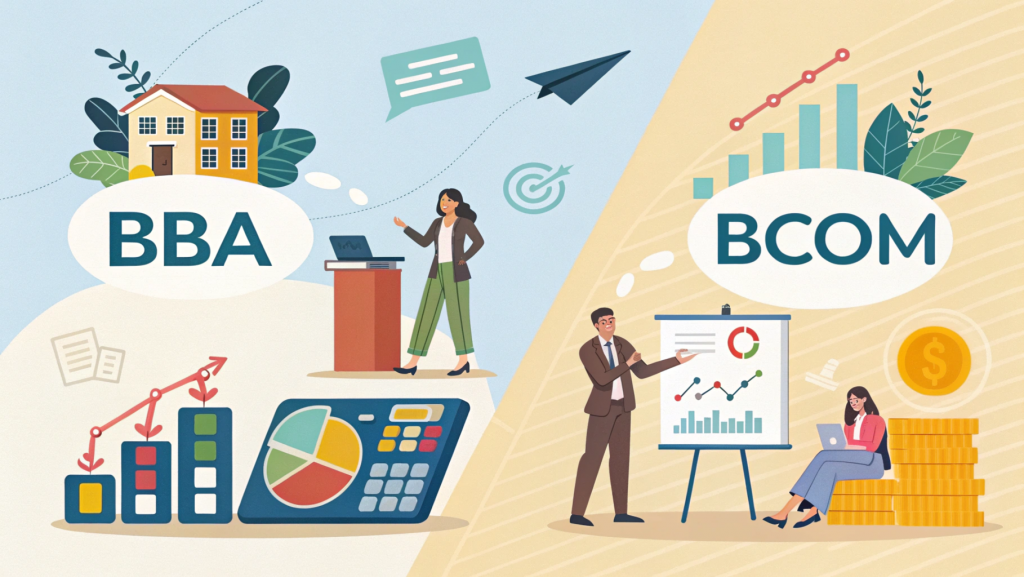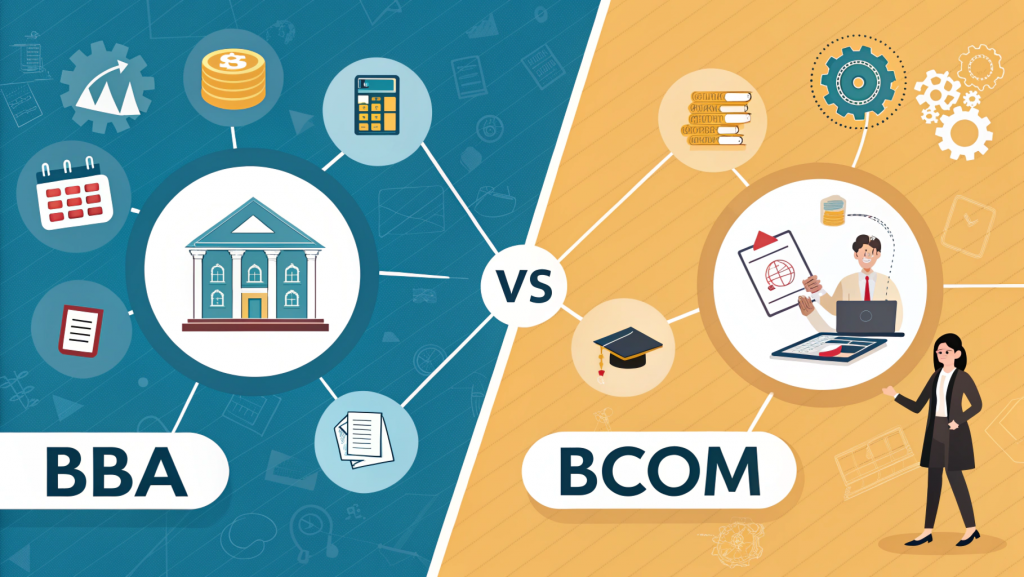When it comes to choosing a career in the world of business and finance, students often get stuck between BBA vs BCom. Both courses open doors to exciting opportunities but follow different paths and focus areas. BBA is more about learning the practical aspects of business management and developing leadership skills. BCom focuses on commerce, accounting and finance giving you a strong foundation in money matters and business transactions.
In this blog, we will break down everything you need to know about BBA vs BCom. From the subjects taught to eligibility requirements, career options, salary prospects and even which course is better if you plan to pursue an MBA, we have got you covered. By the end, you will have a clear idea of which path suits your goals and interests the most.
BBA vs BCom: Course Overview

BBA and BCom are both popular choices for students interested in business and commerce but they focus on different aspects. BBA, which stands for Bachelor of Business Administration, is designed to teach you the practical side of managing a business. You will learn about marketing, human resources, operations, and entrepreneurship. The course is more about building leadership skills, decision-making abilities and understanding how businesses run.
BCom, or Bachelor of Commerce, focuses on the financial and accounting side of things. You will study subjects like taxation, auditing, banking, and financial management. This course gives you a strong foundation in handling money, understanding business laws and analyzing financial data.
In simple words, if you are interested in running or managing a business and want a career in management, BBA is the way to go. If you like numbers, finance and accounting and want to build a career in these areas, BCom will suit you better.
Subjects Taught in Both Courses

Both BBA and BCom cover subjects that prepare you for the business world but they focus on different areas. In BBA, you will study subjects like principles of management, marketing, human resource management, business law, operations management and entrepreneurship. These subjects are designed to help you understand how businesses work and how to manage people and projects effectively.
In BCom, the focus is more on finance and accounting. You will learn subjects like financial accounting, business taxation, auditing, corporate laws, economics and banking. These courses give you a strong foundation in handling money, analyzing financial data and understanding the rules that govern commerce.
Some subjects like business law, economics and statistics may appear in both courses but the way they are taught and applied is different. BBA focuses on using these skills in management and decision-making while BCom focuses on calculations, finance and commerce practices.
Eligibility and Admission Process
Getting into BBA or BCom is fairly straightforward but there are some differences. To be eligible for BBA, you usually need to have completed your 12th grade in any stream from a recognized board. Some colleges may ask for a minimum percentage in your class 12 exams and may also conduct entrance tests or personal interviews as part of the admission process.
For BCom, you also need to have completed your 12th grade but it is preferred that you have studied commerce subjects like accounting, economics or business studies. Some universities may have merit-based admission while others might conduct entrance exams to shortlist candidates.
In both courses, the application process generally involves filling out an online or offline form submitting the required documents and appearing for any selection test if applicable. Knowing the eligibility and admission requirements in advance helps you plan better and increases your chances of getting into the college of your choice.
Career Scope After BBA vs BCom
Which Is Better for MBA Aspirants?
If your goal is to pursue an MBA after graduation, BBA is generally considered the better choice. BBA focuses on management principles leadership skills and business operations which gives you a head start for MBA programs. You will already be familiar with topics like marketing, human resources and project management which are core parts of most MBA courses.
BCom can also lead to an MBA but it is more focused on finance, accounting and commerce. If you choose BCom, you may need to work a bit harder to catch up on management and leadership subjects during your MBA.
In simple terms, BBA prepares you directly for management studies while BCom gives a strong foundation in finance. Choosing BBA makes the transition to MBA smoother and helps you perform better in business strategy and leadership roles.
Salary Comparison
When it comes to salary, both BBA and BCom graduates can earn well but the range and growth opportunities differ. BBA graduates usually start with jobs in management, marketing or operations where the starting salary can be higher because of the leadership and business skills they bring. With experience and further studies like an MBA, their earning potential increases significantly.
BCom graduates often start in finance, accounting or banking roles. The starting salary may be moderate compared to BBA but there is strong growth potential, especially if you pursue professional courses like CA, CMA or CFA. With experience and specialization, BCom professionals can earn very well in finance and consultancy roles.
In simple words, BBA may offer a higher starting salary while BCom provides steady growth and high earning potential in finance and accounting careers. Your skills, experience and additional qualifications play a big role in determining your salary in either path.
Conclusion
Choosing between BBA and BCom depends on your interests career goals and the path you want to take. If you are interested in management leadership and running businesses, BBA is the right choice. It prepares you for management roles and makes the transition to an MBA easier.
If you enjoy finance accounting and commerce, BCom is a better fit. It gives you a strong foundation in money matters and opens opportunities in finance banking and consultancy.
Both courses have strong career potential and good earning opportunities. The key is to understand your strengths and interests and pick the course that aligns with your future goals.
Explore our online programs to become future-ready
Transform your career with industry-aligned courses designed by experts.
View All Courses
